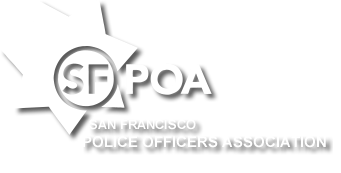By Jack Hart
“Efforts and courage are not enough without purpose and direction.” -JFK
Policing is at a major crossroads. Over the past few weeks and months, our profession has struggled to make sense of where we are and where we are going. In light of national incidents like Ferguson, Staten Island and Baltimore, California’s passage of Proposition 47 and its effect on policing, and local incidents like text messages and criminal convictions of our coworkers, we are all in search of meaning, purpose, and drive in the work that we have done, are doing, and will do. I have spoken to many police officers from the SFPD and all over the country during Blue Courage: Heart and Mind of the Guardian training, whose attendees often take the class to once again find purpose and meaning in their work and to build a roadmap for future personal and professional happiness. The same question often arises: how do I motivate myself and others to not just survive this career but to thrive in it so that I can flourish personally and professionally in it and live a long, meaningful, and relationship-filled life long after retirement?
Daniel Pink gives us some clarity in his book Drive: The Surprising Truth About What Motivates Us, a major topic of discussion during the “Foundations” block of Blue Courage training. Daniel Pink says that motivation simply needs an “upgrade.” While carrots and sticks have worked to motivate donkeys for centuries, and rewarding good behavior and punishing bad behavior was a great way for managers to supervise employees in factories during the industrial revolution (where human beings needed to keep machines working by staying out of their way), motivation remains the same even though the Information/Knowledge worker era is here. In the age of machines, people were necessary but replaceable. Today, policing (all of society for that matter) needs problem solvers filled with empathy, creativity, humility, passion, reverence, humanity, courage, wisdom, integrity, and virtue—all things that cannot be adequately replicated through machines. I always thought that policing could never be outsourced. Now, in the days of 311, online reports, PSAs, and even the possibility of an UBER-type of private police service on the horizon (See: New Orleans has Created an Uber-like Police Force for the French Quarter –theweek.com, 08/06/15), we can no longer get by professionally with “0-0-2,” nor can we get by personally with the cynicism, burnout, divorce, suicide, cancer, and early deaths caused by policing’s stagnant, impoverished environment. If you were not put on this earth to be a “slug,” and money is not the best motivator (we are the highest paid police officers, yet searching for meaning to our work), how are human beings genetically hard-wired to be motivated? Daniel Pink’s answer is: autonomy, mastery, and purpose.
Autonomy: We are hard-wired to be the captains of our ship, the masters of our destiny, and to make our own decisions. If you don’t think so, ask a parent who has raised a child through the “terrible twos.” As a toddler’s brain develops, they begin to realize what they like and don’t like and the word “no!” is one of the first words they like to repeat. This phenomenon repeats itself in the teenage years as well. We bring fiercely motivated and highly independent people into the Police Department and then take their autonomy away through policies and procedures that include directives like “shall.” To maximize autonomy, even in mundane tasks, develop yourself and others to have autonomy of task, time, team, and technique (interestingly, 4 attributes that come easily in SIT, but must be consciously implemented in patrol). True leadership is to find those areas of discretion and to empower ourselves and others to feel safe to be autonomous (to make our own decisions). We must because we are hardwired as human beings to not be micromanaged and controlled. It is not enough to simply be autonomous, however, because consistently making the wrong decisions without improvement is much like doing the same thing over and over again and expecting a different result (Einstein’s definition of insanity). This is where mastery comes in.
Mastery: We are hard-wired to get better at things that matter. Though we may never achieve greatness and mastery at everything we try, we all want the intrinsic satisfaction born of the belief that we are good at something and getting better. If you play golf or play a musical instrument, you are probably not doing those things to join U2 or the PGA tour, but because of the intrinsic motivation—it feels good. Are we consciously working hard to master our craft of policing? Malcolm Gladwell in his book Outliers says that it takes 10,000 hours of hard, deliberate practice to master anything, which translates to about 10 years on the job. Have you worked hard each and every day to get better at being a police officer or have you survived repeating one average year 10 times? Making decisions, accepting responsibility, and continuous improvement are meaningless, however, if they are not in service of a selfless cause. This is where purpose comes in.
Purpose: We want to make a contribution to something greater than ourselves and to leave a legacy. MLK said: “If a man has not discovered something that he will die for, he is not fit to live.” Steven Covey said: “Policing is one of the most noble professions. The actions of a police officer, in an instant, can impact a person for life and a community for generations.” As such, we MUST be committed to the noble purpose of our profession because we MUST get it right at the moment of testing. As police officers, we are one of a profession of 800,000 to uphold the constitution, protect freedom, and preserve democracy for 324 million Americans, in the longest running democracy which was “an experiment predicted to fail,” but for the “rule of law.” Purpose must fuel us during the hard moments of truth and choice, from boredom and routine all the way through crisis, tragedy, and pain.
As much wisdom as there is in these three principles of human motivation, Daniel Pink was wrong, in the order of things! It is NOT autonomy, mastery, and purpose, but rather, purpose, mastery, and autonomy. The more that you are connected to purpose, the greater it will drive you to master your craft. The more that you have mastered your craft, the more autonomy of decision making you will have.
Challenge yourself every day, personally and professionally, to do one thing to commit yourself to YOUR purpose. This means you will have to identify for yourself what drives you and why you chose to be a police officer. Then you may find, that pledging yourself to the nobility of policing, to learning as much as you can, and to making the best decisions possible in every citizen encounter is within your power. Once you are grounded in purpose and mastery in your work, you will become a better partner, spouse, parent, and friend in your personal relationships because you are living a life that has more meaning to you.

